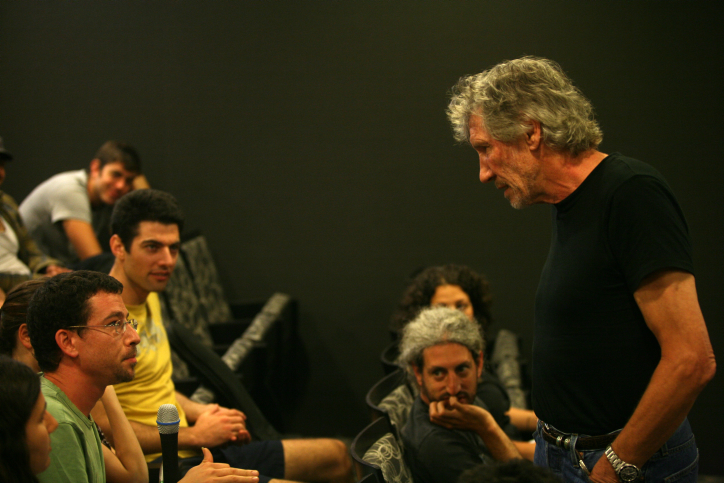The lawsuit offers the most stark example yet of how anti-BDS legislation threatens Americans’ First Amendment rights.

The American Civil Liberties Union announced Wednesday that it had filed suit on behalf of a Kansas public school educator who was asked to disavow a boycott of Israel as a condition for payment. The case comes amid growing concerns that recent state-level legislation across the United States is chilling free speech among proponents of the Boycott, Divestment, and Sanctions movement.
The Kansas law, which came into effect on July 1 of this year, directs the state to “require written certification from all individuals and companies with which it enters into contracts” that they are “not engaged in a boycott of Israel.”
“The First Amendment prohibits the government from using its financial leverage to impose an ideological litmus test,” said ACLU attorney Brian Hauss. “This law is an unconstitutional attempt by the government to silence one side of a public debate by coercing people not to express their beliefs, including through participation in a political boycott.”
A member of the Mennonite Church, Esther Koontz “decided not to buy consumer products made by Israeli companies and international companies operating in Israeli settlements in the occupied Palestinian territories,” the ACLU said. Her decision is in line with the church’s July 2017 resolution “to avoid economic support for the military occupation of Palestinian territories.”
The resolution, which also called on Mennonites “to examine the legacy of anti-Semitism in their own history and life,” followed earlier successful divestment motions by the Presbyterian Church USA, the United Church of Christ, and the United Methodist Church.
“You don’t need to share my beliefs or agree with my decisions to understand that this law violates my free speech rights,” Koontz said. “The state should not be telling people what causes they can or can’t support.”

A nine-year veteran of Wichita public schools, Koontz, a math teacher, now develops school curricula and trains teachers. She had been asked to sign the anti-boycott certification as part of her engagement with the Kansas Department of Education’s Math and Science Partnerships program.
The ACLU complaint asks the court to strike down the state law and bar the Kansas Department of Education from requiring the anti-boycott certification. Legal experts cite as precedent a 1982 Supreme Court decision that reversed a hefty financial judgement against the NAACP for its seven-year boycott of white merchants in Claiborne County, Mississippi. Writing on behalf of the court in that case, Associate Justice John Paul Stevens affirmed “the right of individuals to combine with other persons in pursuit of a common goal by lawful means,” calling that right one of “the foundations of our society.”
According to Chicago-based Palestine Legal, 21 U.S. states have enacted anti-BDS laws. Of these, the Kansas law appears to be the most egregious for its requirement that individuals and companies certify their stance on BDS.
Although other states’ anti-BDS laws vary in their severity, most fall into one or more of three categories, according to Palestine Legal. Some, like those introduced in New York, call for blacklists of individuals, organizations, and companies engaged in boycott. Others prohibit states from entering into contracts with these entities. And still others require state pension funds to divest from “companies that boycott Israel,” including, in some cases, “territories controlled by Israel.”
The state-level campaign to silence BDS activists is part of a nationwide push, backed by groups like StandWithUs and the Emergency Committee for Israel, to combat growing support for the BDS movement — or activists’ right to advocate for it. The drive is supported, in part, by the Israeli government, which, among other measures, has committed millions of dollars to marketing products targeted by the boycott, including those produced on illegal settlements in the West Bank.

Despite these counter-measures, the BDS movement, which grew out of a 2005 call from Palestinian civil society organizations, has continued to gain steam. The LA Times editorial board last year called boycotts of Israel “a protected form of free speech,” and Pink Floyd frontman Roger Waters last month penned an op-ed for the New York Times voicing his opposition to a draft federal bill that would punish BDS supporters with up to 20 years in prison and $1 million in fines.
The ACLU and other groups have also been at the front lines of combating the federal bill, known as the “Israel Anti-Boycott Act.” Although its proponents have argued that it simply “updates” a 1979 law that prohibited participation in the so-called Arab boycott, Palestinian activists and their supporters have successfully framed the legislation as a threat to free speech. (The US Campaign for Palestinian Rights, for example, offers talking points and further links here.)
That’s been enough to turn key Congressional votes against the bill, including that of Democratic Senator Kirsten Gillibrand of New York, who withdrew her support in August, citing civil liberties concerns. Still, Gillibrand and others have not ruled out a vote in favor of the bill. Instead, the New York Democrat called on lawmakers to revise the legislation so that it “does not apply to individuals.”
Given its scope, the ACLU’s bid on behalf of Koontz may well resonate beyond the courtroom, giving policymakers a glimpse into the toll anti-BDS legislation can take on ordinary citizens’ lives. Although today’s suit specifically targets a Kansas law, its emphasis on one educator’s free-speech rights seems likely to further expose the gap between Americans’ growing support for Palestinian freedom and their politicians’ inability to recognize it.

